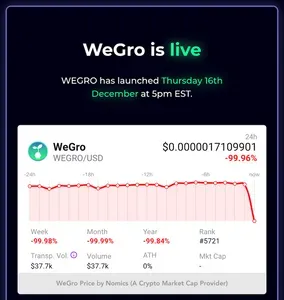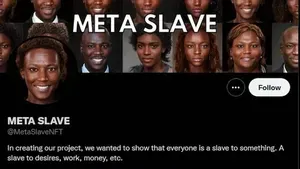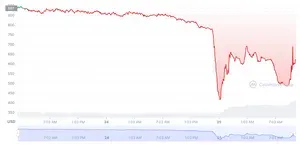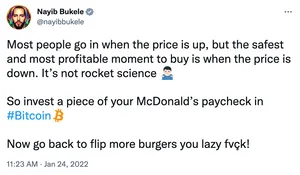WeGro token plunges in value as its developer apparently drains 1,000 BNB ($378,000)
"MetaSlave" project tries to sell NFTs of Black people
Investors suffer enormous losses as "cascading liquidations" tank the Wonderland protocol token price below its supposed intrinsic value
The $TIME tokens are issued against a set of assets that supposedly give the token an intrinsic value, and if the price drops below the backing price, the protocol uses the assets in their treasury to buy back the token to bring it back up to its "fair value". In the day following the crash, the protocol's founders spent several million dollars in buy-backs, which briefly boosted the token back up to trading at around $600.
The project's team reportedly suffered major liquidation losses themselves, with the founder Daniele Sestagalli losing $15 million and the chief developer "0xSifu" losing $1.6 million. Sestagalli briefly caused panic in the community when he set his 300,000+ follower Twitter account to private after tweeting "Dude I just woke up losing 10 m dollars", but set the account back to public shortly after. He retweeted a thread stating that "the internal struggle for growth is cut short by the willingness of some entities to 'eat' all that they'r able to, instead of 'cultivating' and sharing what would be exponential profits in the future."
Promised NFT game "Blockverse" rug pulls 500 ETH ($1.2 million)
John Lennon's son is delighted to be able to "auction off" items from his private Beatles collection without actually, you know, selling anything
Lennon said, "I've been collecting these personal items for about 30 years, and I was getting a bit fed up with them being locked away in a vault, where I've had to keep them because I didn't want them to get damaged... I actually felt very bad about keeping all that stuff locked away." Apparently photographing the items and displaying them digitally somehow was not possible until NFTs came along?
"Now go back to flip more burgers you lazy fvçk!" Nayib Bukele continues horrify those who come across his tweets and realize he's not just a Bitcoin bro but the president of an entire country
Naturally, he failed to mention the nearly 1,000 Bitcoin that he had purchased with taxpayer money since September 2021 at times that Bitcoin was above $50,000.
OpenSea users lose a collective $1.8 million to an issue allowing people to buy NFTs at low prices from old OpenSea listings the sellers thought they'd deleted
A software engineer investigating the incident attributed it to OpenSea's choice to do many of their operations off-chain to save on the expensive gas fees required for any Ethereum blockchain transaction, saying this introduced a disparity where updates were not reflected on-chain. Another person investigating the apparent issue reported that this looked to be the same "glitch" as earlier this month, where users tried to avoid paying the gas fees to delist their NFT sales by swapping them out of their wallet and back again, not realizing the listing would still be active when the NFT was returned.
OpenSea added an "Inactive listings" page to allow people to view listings that are still associated with NFTs that have been transferred out of the wallet, though the feature doesn't seem to have been widely publicized and it's not clear when it was released. They also later reimbursed users who suffered losses from this exploit, to the tune of about $1.8 million.
Solfire Finance rug pulls for $4.8 million
However, on January 23, the project developers drained around $4.8 million from the project before deleting the project's website and social media accounts.









